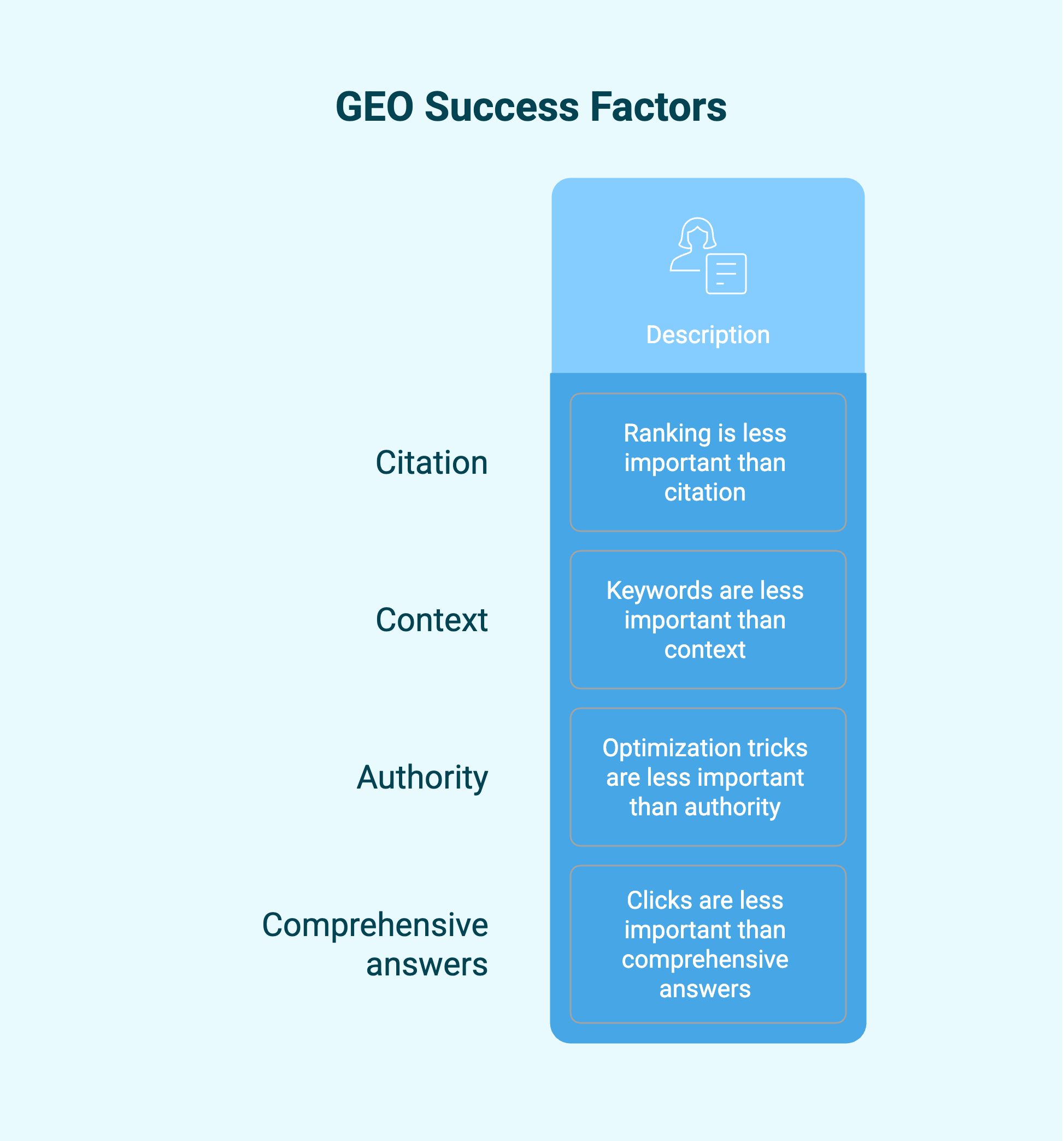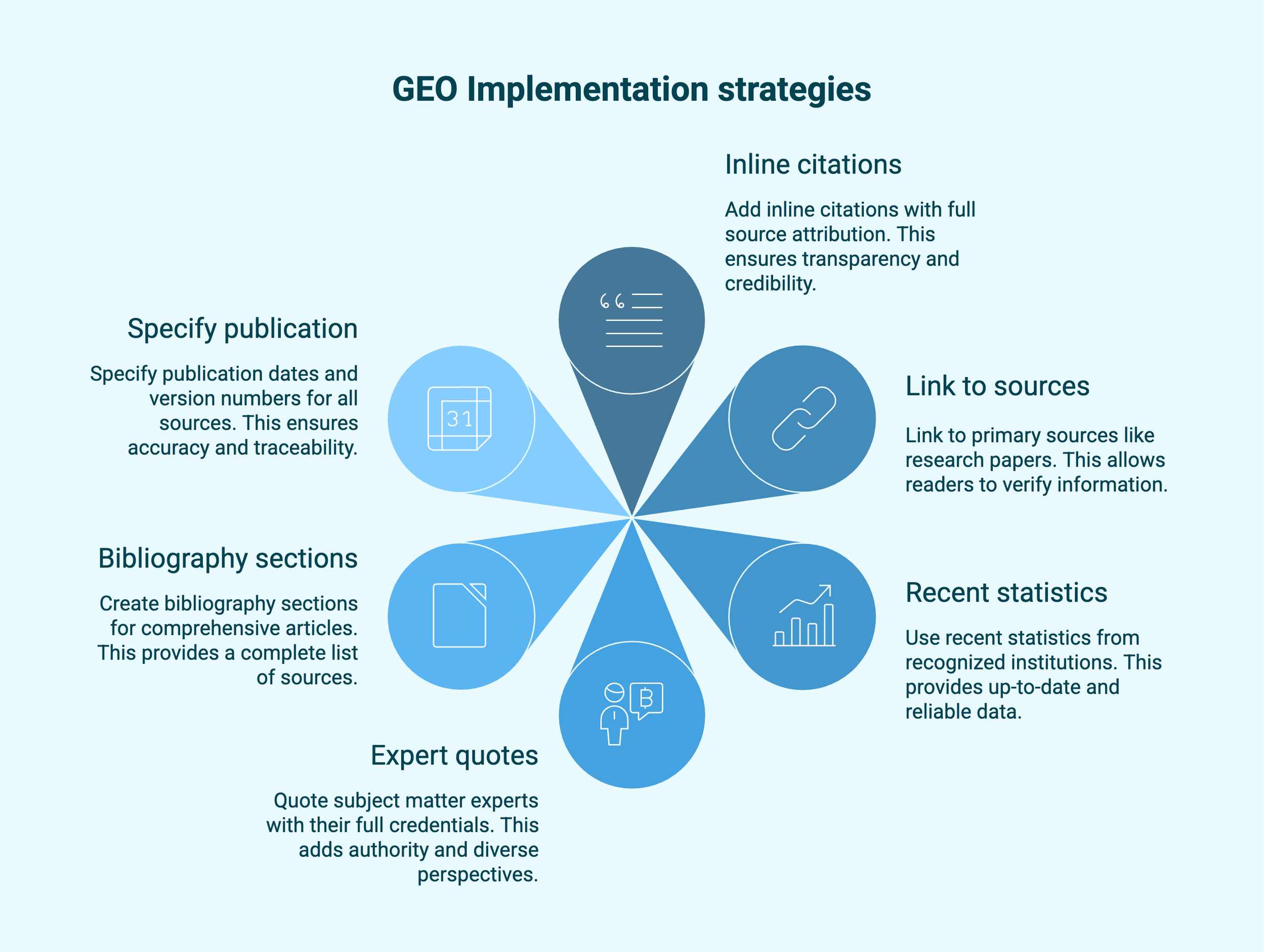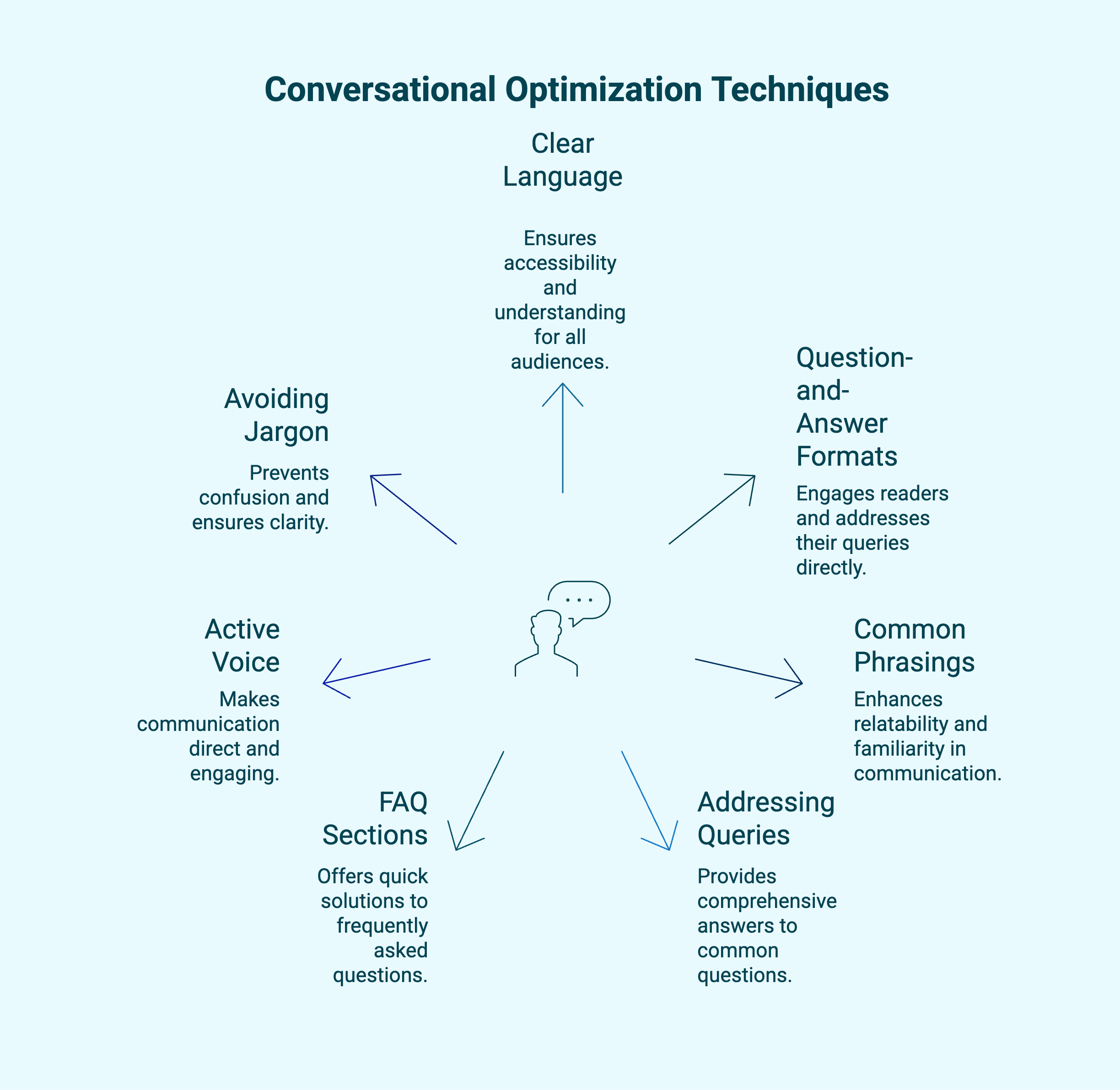How to Create Authoritative Content for Generative Engine Optimization (GEO)
Generative AI is creating disruptions across many online activities including traditional online search. As AI-powered systems increasingly enable people to find information online, a new discipline has emerged: Generative Engine Optimization (GEO). Unlike traditional SEO, which optimizes for search engine algorithms, GEO focuses on making content discoverable and citable by generative AI systems like ChatGPT, Claude, Perplexity, and Google's AI Overviews.
Authoritative content has become the cornerstone of GEO success. When AI systems synthesize answers from across the web, they prioritize sources that demonstrate expertise, credibility, and trustworthiness. Content that lacks these qualities gets overlooked, regardless of traditional SEO metrics.
Understanding GEO
What is Generative Engine Optimization?
Generative Engine Optimization is the practice of optimizing content to be discovered, understood, and cited by AI language models and generative search engines. While traditional search engines return links to web pages, generative engines synthesize information from multiple sources to create comprehensive answers. GEO ensures your content becomes part of those synthesized responses.
How GEO Differs from Traditional SEO
Traditional SEO optimizes for visibility in search engine results pages (SERPs) through keywords, backlinks, and technical optimization. GEO, however, optimizes for citation and inclusion in AI-generated responses. The key differences include:
Citation over ranking: Success in GEO means being referenced as a source, not necessarily appearing first in results
Context over keywords: AI systems understand semantic meaning, making contextual relevance more important than keyword density
Authority over optimization tricks: AI models evaluate credibility signals that can't be gamed through technical tactics
Comprehensive answers over clicks: Content must provide complete, accurate information rather than teasing users to click through
Key AI Platforms Where GEO Matters
GEO strategies apply across multiple AI-powered platforms:
Conversational AI assistants: ChatGPT, Claude, Gemini
AI-powered search engines: Perplexity, You.com, Neeva
Traditional search AI features: Google AI Overviews, Bing Chat
Enterprise AI tools: Microsoft Copilot, custom GPTs
Voice assistants: Alexa, Siri, Google Assistant
What Does "Authoritative Content" Mean in GEO?
E-E-A-T Defined for the AI Era
Google's E-E-A-T framework (Experience, Expertise, Authoritativeness, Trustworthiness) has evolved beyond traditional SEO to become essential for GEO:
Experience: First-hand knowledge demonstrated through specific examples, case studies, and practical insights
Expertise: Deep subject matter knowledge evidenced by technical accuracy and comprehensive coverage
Authoritativeness: Recognition as a leading source in your field through citations, credentials, and industry standing
Trustworthiness: Reliability demonstrated through accuracy, transparency, and ethical content practices
Why AI Systems Prioritize Authoritative Content
AI models are trained to identify and surface high-quality information. They evaluate authority through multiple signals:
Consistency with established facts and consensus views
Presence of supporting evidence and citations
Author credentials and institutional affiliations
Cross-referencing with other authoritative sources
Technical accuracy and depth of coverage
Recency and relevance of information
Examples of Authority in Practice
Authoritative content example: A medical article written by a board-certified physician, citing peer-reviewed studies, published on a hospital website, with clear methodology and recent updates.
Non-authoritative content example: A health blog post with no author attribution, making claims without sources, containing outdated information, published on a site with no medical credentials.
Steps to Creating Authoritative Content for GEO
Cite Credible Sources and Use Reliable Data
Documentation and evidence form the backbone of authoritative content. AI systems cross-reference claims against their training data, making proper citation essential.
Implementation strategies:
Include inline citations with full source attribution
Link to primary sources whenever possible (research papers, official reports, original data)
Use recent statistics from recognized institutions
Quote subject matter experts with their full credentials
Create bibliography sections for comprehensive articles
Specify publication dates and version numbers for all sources
Citation structure example:
"According to a 2024 study by MIT researchers published in Nature (Smith et al., 2024), 73% of businesses have adopted some form of AI automation, compared to just 12% in 2020."
Showcase Experience and Expertise
Author credibility directly influences how AI systems evaluate content authority. Make expertise visible and verifiable.
Author authority signals:
Comprehensive author bios with relevant credentials
LinkedIn profiles and professional affiliations
Published works and speaking engagements
Industry certifications and awards
Years of experience in the field
Educational background from recognized institutions
Implementation tactics:
Create detailed author pages with structured data markup
Include author boxes on every article
Feature expert reviewers and contributors
Display trust badges and certifications prominently
Link to author's other authoritative work
Update bios regularly with new achievements
Produce Original, Comprehensive Insights
AI systems value content that adds unique value to the information ecosystem. Surface-level summaries get bypassed for sources offering deeper analysis.
Creating original value:
Conduct and publish original research with methodology
Analyze existing data to reveal new patterns
Provide expert commentary on industry developments
Create comprehensive guides that synthesize multiple sources
Offer unique frameworks or methodologies
Include proprietary data or exclusive interviews
Depth indicators for AI:
Word count appropriate to topic complexity (typically 2,000+ words for comprehensive guides)
Multiple sections covering different aspects
Detailed examples and case studies
Step-by-step processes and tutorials
Comparison tables and analysis
Actionable takeaways and implementation guides
Structure for AI and Human Readability
Clear structure helps AI systems parse and understand content effectively. Well-organized content is more likely to be referenced for specific queries.
Structural best practices:
Use descriptive H2 and H3 headings that answer specific questions
Create logical content hierarchies with consistent formatting
Include tables for comparative information
Use numbered lists for sequential processes
Add bullet points for key takeaways
Write clear topic sentences for each paragraph
Include summary sections for long articles
AI-friendly formatting elements:
## Clear Section Heading
Brief introduction to section topic.
### Specific Subsection
- Key point with supporting detail
- Another important consideration
- Third essential element
| Comparison Factor | Option A | Option B |
|-------------------|----------|----------|
| Cost | $100 | $150 |
| Performance | High | Medium |
Maintain Freshness and Accuracy
AI systems consider content recency when evaluating relevance. Outdated information reduces authority scores.
Freshness strategies:
Display clear publication and last-updated dates
Review and update statistics annually
Add new sections as developments occur
Correct errors promptly with transparency
Archive outdated content appropriately
Create evergreen frameworks with timely examples
Use "as of [date]" qualifiers for time-sensitive data
Update documentation:
Maintain visible revision history
Note significant changes in update logs
Use "Updated" badges for recently revised content
Include seasonal or annual review cycles
Set calendar reminders for content audits
Employ Natural Language and Anticipate Queries
AI systems are trained on conversational data, making natural language patterns more recognizable and citable.
Conversational optimization techniques:
Write in clear, accessible language
Use question-and-answer formats
Include common phrasings and variations
Address "how," "what," "why," and "when" queries directly
Add FAQ sections with specific questions
Use active voice and direct statements
Avoid jargon without explanation
Query anticipation examples:
Instead of: "Revenue optimization through systematic analysis"
Write: "How to increase your revenue: A systematic approach"
Instead of: "Implementation methodology considerations"
Write: "How do you implement this method? Here's a step-by-step guide"
Build External Authority and Earn Citations
External validation signals strengthen your content's authority profile for AI evaluation.
Authority-building tactics:
Guest post on high-authority sites in your industry
Collaborate with recognized experts
Get cited by academic papers or industry reports
Earn mentions from authoritative news sources
Build relationships with industry influencers
Participate in expert panels and interviews
Create citable research and data
Backlink quality over quantity:
Focus on editorial links from relevant, authoritative domains
Seek citations from .edu and .gov sites when appropriate
Earn mentions in industry publications
Get listed in professional directories
Participate in expert roundups
Create linkable assets (research, tools, guides)
Measuring Authority & GEO Success
Tracking Citations in AI Results
Monitor how generative AI systems reference your content:
Test queries in ChatGPT, Claude, and Perplexity
Document when your content is cited as a source
Track brand mentions in AI-generated responses
Monitor which content pieces get referenced most
Analyze the context of citations
Compare citation frequency with competitors
Analytics and Performance Metrics
Key performance indicators for GEO:
Direct metrics: Citations in AI responses, brand mentions, source attributions
Indirect metrics: Increased direct traffic, longer session durations, returning visitors
Authority signals: Growth in backlinks, social shares, expert citations
Engagement metrics: Comments from professionals, industry shares, media mentions
Tools for GEO Monitoring
Citation tracking: Manual testing across AI platforms
Brand monitoring: Google Alerts, Mention, Brand24
Authority metrics: Ahrefs Domain Rating, Moz Domain Authority
Content performance: Google Analytics 4, Search Console
Competitor analysis: SEMrush, Similarweb
GEO Content Best Practices Checklist
Do's:
✓ Cite credible sources with full attribution
✓ Include author credentials and expertise signals
✓ Create comprehensive, in-depth content
✓ Use clear structure with descriptive headings
✓ Update content regularly with fresh information
✓ Write in natural, conversational language
✓ Build external authority through quality backlinks
✓ Include original research and unique insights
✓ Add FAQ sections addressing common questions
✓ Use structured data markup for better understanding
Don'ts:
✗ Publish content without author attribution
✗ Make claims without supporting evidence
✗ Create thin, surface-level content
✗ Use complex jargon without explanation
✗ Let content become outdated
✗ Keyword stuff or over-optimize
✗ Copy or lightly rewrite existing content
✗ Ignore factual accuracy for engagement
✗ Hide important information behind paywalls
✗ Neglect mobile and accessibility considerations
Conclusion
The shift toward AI-mediated information discovery is reshaping how content creators must approach authority and credibility. Generative Engine Optimization isn't just another marketing tactic; it's a return to quality, expertise, and genuine value creation.
Success in GEO requires commitment to producing authoritative content that serves both AI systems and human readers. This means investing in expertise, maintaining accuracy, and building genuine authority in your field. The tactics may be new, but the principle is timeless: create content that truly deserves to be cited as a trusted source.
The organizations that master GEO today will become the authoritative voices that AI systems turn to tomorrow. As generative AI continues to transform how people find and consume information, your investment in authoritative content will determine whether your expertise gets amplified or overlooked.
Ready to build your GEO authority? Start by auditing your existing content against the practices outlined in this guide. Identify gaps in citations, expertise signals, and structural clarity. Then, commit to creating new content that meets the highest standards of authority and trustworthiness. The AI-driven future of search is being written now, and your authoritative content can be part of the conversation.




